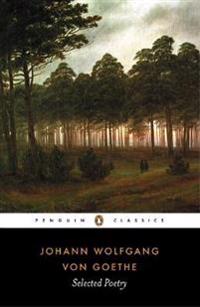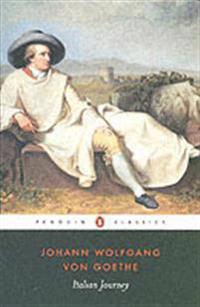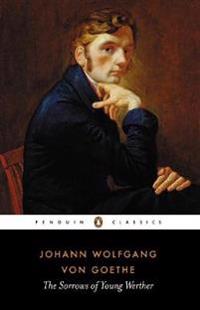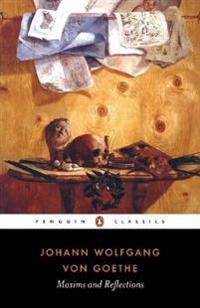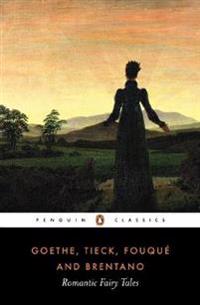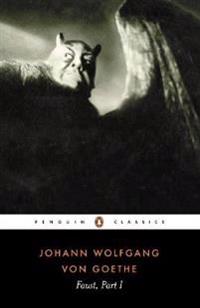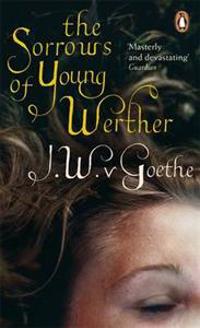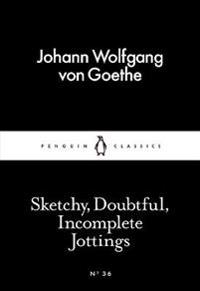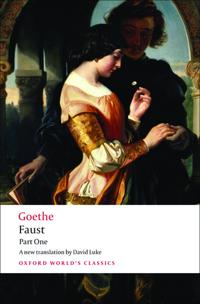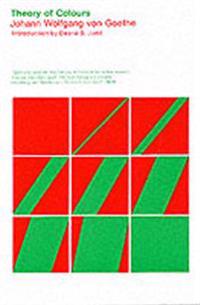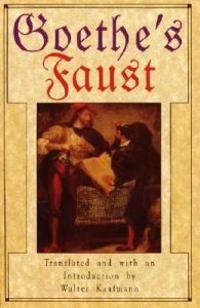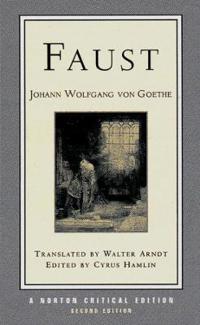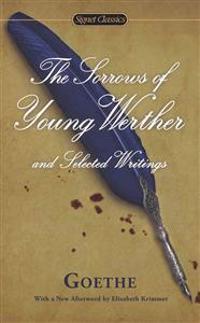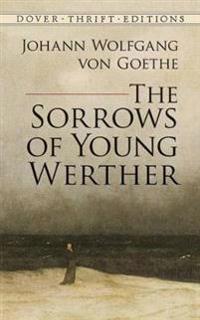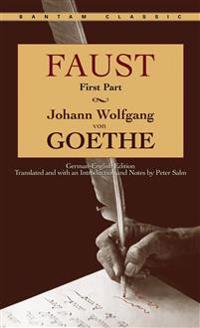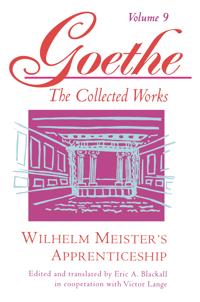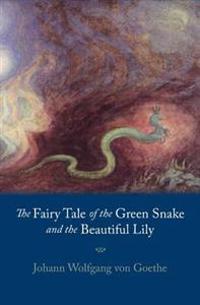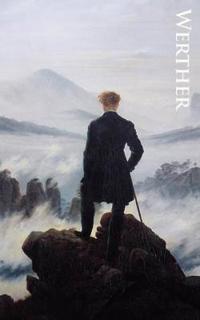Selected Poetry (Storpocket)
avJohann Wolfgang von Goethe
ISBN: 9780140424560 - UTGIVEN: 200504This is to be the first verse translation of Goethe's poetry in penguin classics and replaces Luke's own 1964 prose translation which has been in print continuously since then.[...]
Italian Journey 1786-1788 (Storpocket)
avJohann Wolfgang von Goethe
ISBN: 9780140442335 - UTGIVEN: 198210In 1786, when he was already the acknowledged leader of the Sturm und Drang literary movement, Goethe set out on a journey to Italy to fulfil a personal and artistic quest and to find relief from his responsibilities and the agonies of unrequited love. As he travelled to Venice, Rome, Naples and Sic[...]
The Sorrows of Young Werther (Storpocket)
avJohann Wolfgang von Goethe
ISBN: 9780140445039 - UTGIVEN: 198903A key work in the German 'Sturm und Drang' movement, Johann Goethe's autobiographical epistolary novel "The Sorrows of Young Werther" is a defining moment in early Romanticism, which has influenced writers from Mary Shelley to Thomas Mann. This "Penguin Classics" edition is translated from with an i[...]
Maxims and Reflections (Storpocket)
avJohann Wolfgang von Goethe
ISBN: 9780140447200 - UTGIVEN: 199808Throughout his long, hectic and astonishingly varied life, Johann Wolfgang von Goethe (1749-1832) would jot down his passing thoughts on theatre programmes, visiting cards, draft manuscripts and even bills ...Goethe was probably the last true 'Renaissance Man'. Although employed as a Privy Councillo[...]
Romantic Fairy Tales (Storpocket)
avCarol Tully, Johann Wolfgang von Goethe
ISBN: 9780140447323 - UTGIVEN: 200004The four works collected in this volume reveal the fascinating preoccupations of the German Romantic movement, which revelled in the inexplicable, the uncanny and the unknown and, especially, the mysterious world of the fairy tale. Goethe's richly imaginative "Fairy Tale" (1795) depicts an ethereal [...]
Faust, Part I (Storpocket)
avJohann Wolfgang von Goethe
ISBN: 9780140449013 - UTGIVEN: 200507Goethe's Faust reworks the late-medieval myth of Dr Faust, a brilliant scholar so disillusioned he resolves to make a contract or wager with the devil, Mephistopheles. The devil will do all he asks on Earth and seek to grant him a moment in life so glorious that he will wish it to last for ever. But[...]
The Sorrows of Young Werther (Pocket)
avJohann Wolfgang von Goethe
ISBN: 9780141023441 - UTGIVEN: 200601You only find true love once. When Werther dances with the beautiful Lotte, it seems as though he is in paradise. It is a joy, however, that can only ever be short-lived. Engaged to another man, she tolerates Werther's adoration and encourages his friendship. She can never return his love. Broken-he[...]
Sketchy, Doubtful, Incomplete Jottings (Häftad)
avJohann Wolfgang von Goethe
ISBN: 9780141397139 - UTGIVEN: 2015-02'I can promise to be candid, not, however, to be impartial.' A selection of the most insightful maxims and reflections from one of Germany's greatest ever thinkers. Introducing Little Black Classics: 80 books for Penguin's 80th birthday. Little Black Classics celebrate the huge range and diversity o[...]
Faust (Häftad)
avJohann Wolfgang von Goethe
ISBN: 9780199536214 - UTGIVEN: 200805The legend of Faust grew up in the sixteenth century, a time of transition between medieval and modern culture in Germany. Johann Wolfgang von Goethe (1749-1832) adopted the story of the wandering conjuror who accepts Mephistopheles's offer of a pact, selling his soul for the devil's greater knowled[...]
Erotic Poems (Pocket)
avJohann Wolfgang Von Goethe
ISBN: 9780199549726 - UTGIVEN: 2008-10-01Editorial censorship has long obscured Goethe's Roman Elegies, which were inspired by Goethe's sexual liberation in Italy and his love for the woman he took as his unofficial wife on his return to Germany. They are here presented as Goethe boldly conceived them, together with the long-supressed narr[...]
Elective Affinities (Pocket)
avJohann Wolfgang Von Goethe
ISBN: 9780199555369 - UTGIVEN: 2008-12-15Metamorphosis of Plants, The (Övrig)
avJohann Wolfgang Von Goethe
ISBN: 9780262013093 - UTGIVEN: 2009-09-08The Metamorphosis of Plants, published in 1790, was Goethe's first major attempt to describe what he called in a letter to a friend "the truth about the how of the organism." Inspired by the diversity of flora he found on a journey to Italy, Goethe sought a unity of form in diverse structures. He ca[...]
Theory of Colours (Häftad)
avJohann Wolfgang von Goethe
ISBN: 9780262570213 - UTGIVEN: 197001By the time Goethe's Theory of Colours appeared in 1810, the wavelength theory of light and color had been firmly established. To Goethe, the theory was the result of mistaking an incidental result for an elemental principle. Far from pretending to a knowledge of physics, he insisted that such knowl[...]
Selected Works (Inbunden)
avJohann Wolfgang von Goethe
ISBN: 9780375410444 - UTGIVEN: 200005Published in concert with the 250th anniversary of Goethe's birth, this selection of great works from the German writer includes The Sorrows of Young Werther and Faust, among others.[...]
Faust (Häftad)
avJohann Wolfgang von Goethe
ISBN: 9780385031141 - UTGIVEN: 199801The best translation of Faust available, this volume provides the original German text and its English counterpart on facing pages. Walter Kaufmann's translation conveys the poetic beauty and rhythm as well as the complex depth of Goethe's language. Includes Part One and selections from Part Two.[...]
Faust (Häftad)
avJohann Wolfgang von Goethe
ISBN: 9780393972825 - UTGIVEN: 200010This edition includes both part I and II of the drama. It represents a significant departure from its predecessor in terms of supporting apparatus and the "Interpretative Notes" have been expanded. "Contexts" includes five new selections by Goethe on the composition of the novel. "Criticism" include[...]
The Sorrows of Young Werther and Selected Writings (Pocket)
avJohann Wolfgang von Goethe, Elisabeth Krimmer
ISBN: 9780451418555 - UTGIVEN: 2013-03"The Sorrows of Young Werther" brings to life an idyllic German village where a youth on vacation meets and falls for lovely Charlotte. The tragedy unfolds in the letters Werther writes to his friend about Charlotte's charms, even after he realizes his love will remain unrequited. "Reflections on We[...]
The Sorrows of Young Werther (Pocket)
avJohann Wolfgang Von Goethe, Thomas Carlyle, R. D. Boylan
ISBN: 9780486424552 - UTGIVEN: 200210One of the world's first best-sellers, this tragic masterpiece attained an instant and lasting success upon its 1774 publication. A sensitive exploration of the mind of a young artist, the tale addresses age-old questions--the meaning of love, of death, and the possibility of redemption--in the form[...]
Faust (Häftad)
avJohann Wolfgang von Goethe, Peter Salm
ISBN: 9780553213485 - UTGIVEN: 192001Goethe's masterpiece and perhaps the greatest work in German literature, Faust""has made the legendary German alchemist one of the central myths of the Western world. Here indeed is a monumental Faust, an audacious man boldly wagering with the devil, Mephistopheles, that no magic, sensuality, experi[...]
Wilhelm Meister's Apprenticeship (Pocket)
avJohann Wolfgang Von Goethe, Eric A. (EDT) Blackall, Eric A. Blackall
ISBN: 9780691043449 - UTGIVEN: 1995-04"Wilhelm Meister's Apprenticeship", a novel of self-realization greatly admired by the Romantics, has been called the first Bildungsroman and has had a tremendous influence on the history of the German novel. The story centers on Wilhelm, a young man living in the mid-1700s who strives to break free[...]
Conversations of German Refugees (Pocket)
avJohann Wolfgang Von Goethe
ISBN: 9780691043456 - UTGIVEN: 1995-10-16Behavioral Economics and Its Applications (Inbunden)
avJohann Wolfgang von Goethe
ISBN: 9780691122847 - UTGIVEN: 200703In the last decade, behavioral economics, borrowing from psychology and sociology to explain decisions inconsistent with traditional economics, has revolutionized the way economists view the world. But despite this general success, behavioral thinking has fundamentally transformed only one field of [...]
The Sorrows Of Young Werther (Pocket)
avJohann Wolfgang Von Goethe, Burton Pike, Burton Pike
ISBN: 9780812969900 - UTGIVEN: 200502Fairy Tale of the Green Snake and the Beautiful Lily (Häftad)
avJohann Wolfgang Von Goethe
ISBN: 9780833400260 - UTGIVEN: 1991-06The Sorrows of Young Werther (Häftad)
avJohann Wolfgang Von Goethe, Liberty Hardy
ISBN: 9780988537002 - UTGIVEN: 2012-12

